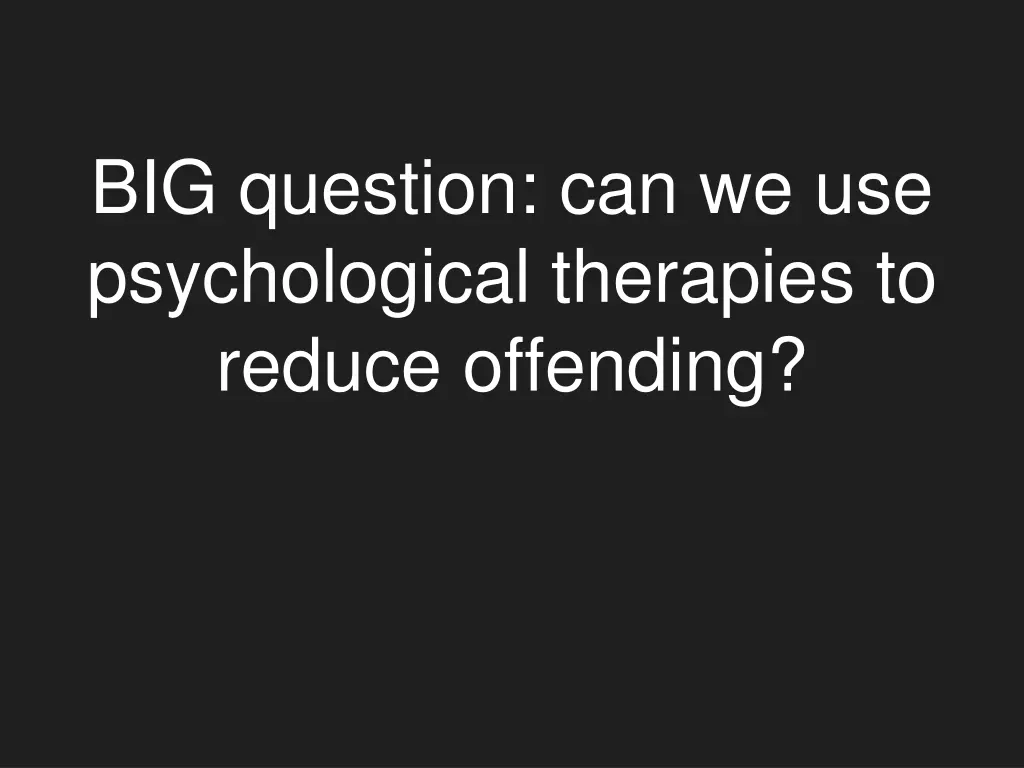
Reducing Offending Through Psychological Therapies
Explore the effectiveness of anger management in reducing offending behaviors through cognitive behavioral treatments. Learn about anger management training, meta-analysis studies, and the positive impact on recidivism rates. Discover how psychological therapies can help address anger-related issues to promote behavior change and lower reoffending rates.
Uploaded on | 2 Views
Download Presentation

Please find below an Image/Link to download the presentation.
The content on the website is provided AS IS for your information and personal use only. It may not be sold, licensed, or shared on other websites without obtaining consent from the author. If you encounter any issues during the download, it is possible that the publisher has removed the file from their server.
You are allowed to download the files provided on this website for personal or commercial use, subject to the condition that they are used lawfully. All files are the property of their respective owners.
The content on the website is provided AS IS for your information and personal use only. It may not be sold, licensed, or shared on other websites without obtaining consent from the author.
E N D
Presentation Transcript
BIG question: can we use psychological therapies to reduce offending?
Anger and offending an arousal state of antagonism toward someone or something perceived to be the source of an aversive event (Novaco, 2000) Impulsive violence Anger Premeditated violence Nonviolent offending? psychlotron.org.uk
Anger and violent offending (Novaco, 2011) Justificatory schemas Stimulus VIOLENCE Cognitive appraisal Reduced inhibitions Anger Disrupted reappraisal psychlotron.org.uk
Anger management training Anger management is a cognitive behavioural treatment. What assumptions are made about the underlying problem and solution? What sorts of techniques are likely to be involved? psychlotron.org.uk
Anger management training Brief (20-40 hours) intervention Aims: Understand nature of anger and link with violence. Recognise the signs of anger and diffuse them. Notice and substitute cognitions that cause and sustain anger. Teach coping strategies for anger. Teach appropriate alternatives to aggression. Group based, with (1) cognitive preparation; (2) skills acquisition; (3) application practice. psychlotron.org.uk
What is a meta-analysis? psychlotron.org.uk
Effectiveness of anger management Meta analysis by Henwood et al (2015): Searched literature, 3000+ potentially relevant studies. Identified subset of 61 articles. 48 excluded (inadequate methodology). 14 studies considered: CBT-based AMT RCT or NRCT with suitable control group 50%+ adult male offender samples Reconviction as outcome measure psychlotron.org.uk
Effectiveness of anger management psychlotron.org.uk
Effectiveness of anger management Overall: 23% reduction in general recidivism with AMT. 28% reduction in violent recidivism with AMT. psychlotron.org.uk
Problem with the research Selection bias - less risky clients channeled towards treatment? Performance bias - treatment not delivered as designed? Measurement bias - reconviction data poor? Attrition bias - dropouts more likely to reoffend? Reporting bias - unfavourable data left out? psychlotron.org.uk
